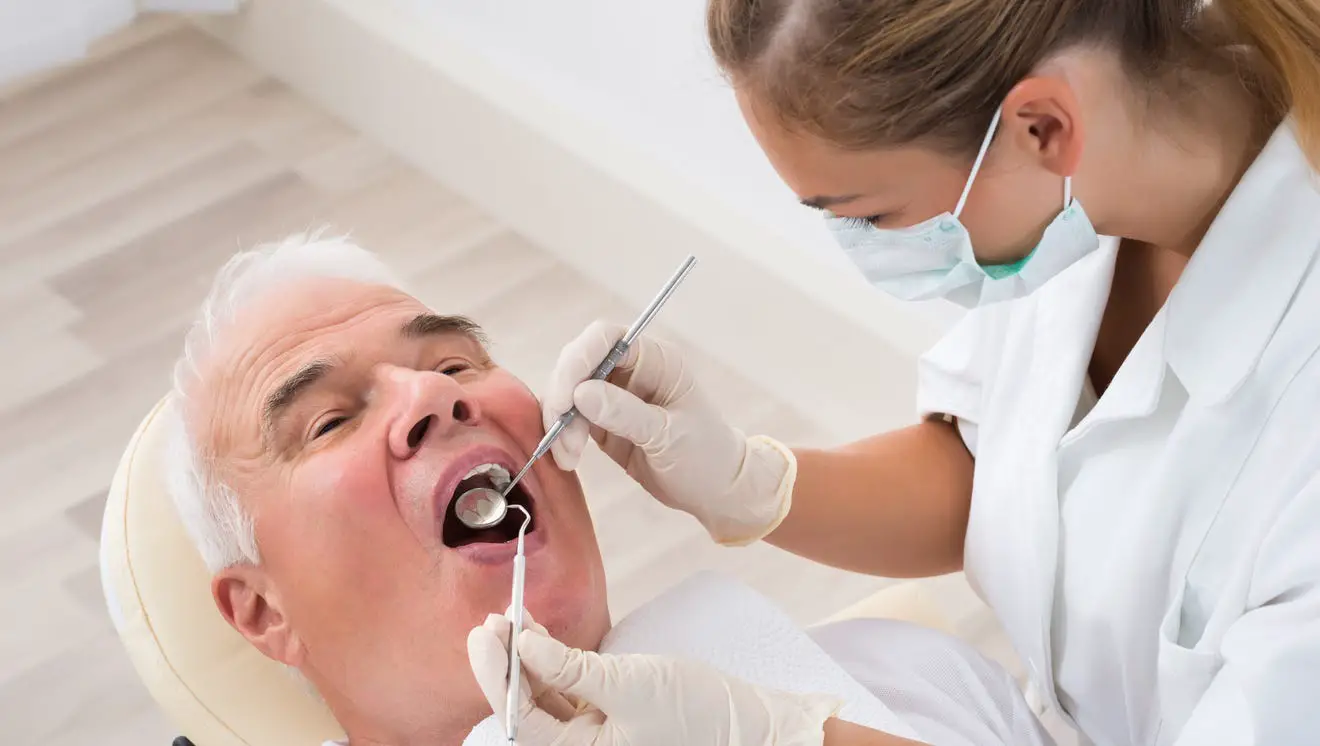A Guide To Medicare Dental Coverage
Approximately one in four seniors aged 65 and over have gone five years or more since their last dental visit, according to the National Institute of Dental and Craniofacial Research . Additionally, 16 percent of individuals in this age range consider their oral health as poor.
The American Dental Association adds that individuals 60 and over often face some rather unique dental concerns. For instance, there are more than 500 medications that cause dry mouth, some of which are prescribed for high blood pressure, high cholesterol, Parkinsons, and Alzheimers disease. This is important because the ADA cites dry mouth as a common cause of cavities in older adults.
Other oral health concerns that appear more often in older adults include gum disease and mouth cancer, according to the ADA.
Is Oral Surgery Covered By Medicare
Whether Medicare covers oral surgery depends on many factors. In the typical sense, Medicare does not provide coverage for dental services. This includes oral surgeries or procedures performed by an oral surgeon.
If a physician deems oral surgery or a similar procedure medically necessary as part of a more significant health condition that Medicare typically covers, then it would receive coverage from Medicare Part B.
What Dental Care Is Not Covered By Medicare
Original Medicare Parts A and B do not cover dental care or oral surgery performed primarily for tooth health. Care not covered includes:
- Oral exams
- Tooth extractions
- Dentures
- Dental plates
- Other dental devices such as crowns, bridges and implants
Medicare will not cover oral surgery that is intended to treat teeth, such as installing bridges, crowns or dentures. If you dont have additional dental insurance or Part C coverage, you will pay entirely out-of-pocket for non-covered services.
Its important to note that even if your oral surgery or dental procedure is covered, Medicare will likely not pay for follow-up dental care after the health condition has been treated.
Read Also: Will Medicare Pay For Breast Augmentation
Medicare And Dental Coverage
The Medicare law doesn’t allow for coverage of dental care or services needed for the health of your teeth, including cleanings, fillings, dentures and tooth extractions. This also includes dental implants.
The law does carve out an allowance for payment of services that are part of another covered procedure, such as the reconstruction of your jaw after an injury. It will also sometimes cover oral exams required for a kidney transplant or heart valve replacement, although not for any dental treatment you may need before or after the primary surgery. A required oral exam would be covered under Medicare Part A if a hospital dentist performs it and under Medicare Part B if a doctor performs it.
If you think dental implants are in your future, you may want to investigate joining a Medicare Advantage plan, most of which offer dental benefits, according to the KFF, a health policy nonprofit. You may have to pay a higher premium for coverage that goes beyond routine dental care. And, typically, you’re still on the hook for about 50% of the cost of the implant process.
If youre sticking with Original Medicare, consider a stand-alone dental plan that specifically offers coverage for dental implants. This likely won’t pay for all costs there may be coinsurance and a maximum annual benefit amount but it may cover enough to be worth it.
American Hospital Association Disclaimer

The American Hospital Association has not reviewed, and is not responsible for, the completeness or accuracy of any information contained in this material, nor was the AHA or any of its affiliates, involved in the preparation of this material, or the analysis of information provided in the material. The views and/or positions presented in the material do not necessarily represent the views of the AHA. CMS and its products and services are not endorsed by the AHA or any of its affiliates.
Also Check: Is Medicare Advantage And Medicare Supplement The Same Thing
Policy Limitations And Exclusions
Dental services provided for the routine care, treatment, or replacement of teeth or structures or structures directly supporting the teeth are generally excluded from coverage under Aetna’s medical plans, except under the limited circumstances outlined below.
Treatment of Jaw and Contiguous Structures
Some Aetna medical plans provide coverage for some dental related services, and for certain “dental-in-nature” oral and maxillofacial surgery services that are related to the jaw or facial bones. Reduction of any facial bone fractures is covered under all Aetna medical plans. Standard HMO and traditional plans cover the removal of tumors, treatment of dislocations, facial and oral wounds/lacerations, and removal of cysts or tumors of the jaws or facial bones, or other diseased tissues. Members should refer to their plan documents for information regarding applicable terms and limitations of coverage.
Medical Services Provided by a Dentist
Medically necessary medical services that could be performed by a physician but are performed by a dentist are covered if performance of those services is within the scope of the dentist’s license, according to state law. These services may include, but are not limited to, the following:
Services Excluded Under Part B
The following two categories of services are excluded from coverage:
A primary service provided for the care, treatment, removal, or replacement of teeth or structures directly supporting teeth, e.g., preparation of the mouth for dentures, removal of diseased teeth in an infected jaw.
A secondary service that is related to the teeth or structures directly supporting the teeth unless it is incident to and an integral part of a covered primary service that is necessary to treat a non-dental condition and it is performed at the same time as the covered primary service and by the same physician/dentist. In those cases in which these requirements are met and the secondary services are covered, Medicare does not make payment for the cost of dental appliances, such as dentures, even though the covered service resulted in the need for the teeth to be replaced, the cost of preparing the mouth for dentures, or the cost of directly repairing teeth or structures directly supporting teeth .
Don’t Miss: How Often Does Medicare Pay For Diabetic Foot Care
Does Medicare Cover Wisdom Teeth Removal
In most cases, Medicare does not cover wisdom teethremoval .
Wisdom teeth are the last teeth to appear in your mouth, found the farthest back. Sometimes, wisdom teeth become impacted, or stuck, and they grow at an odd angle, causing complications. Other times, wisdom teeth dont form or grow in at all. When wisdom teeth cause problems, such as pain, they may need to be removed. They can also cause damage to other teeth, including moving them around.
Usually, wisdom teeth come in when youre between the ages of 17-25. After that, if you havent had issues or pain, you likely never will.
Medicare Doesnt Cover Dental But There Are A Few Exceptions For Children And Concession Card Holders
Were reader-supported and may be paid when you visit links to partner sites. We dont compare all products in the market, but were working on it!
Most dental treatments aren’t covered by Medicare, which is why most of us take out extras cover. However, if you’re a concession card holder or you have children but can’t afford to pay, you might be eligible for free dental with Medicare.
Also Check: How To Apply For Medicare By Phone
Does Medicare Pay For Oral Surgery
If oral surgery is deemed medically necessary and is performed by a Medicare-participating doctor or surgeon, it may be covered by Medicare.
Examples of covered oral surgery may include:
- Part of a treatment plan for certain medical conditions, such as cancer or heart disease.
- Part of a covered procedure, like reconstruction of your jaw after an injury.
- Oral exams prior to a heart valve replacement or kidney transplant.
- Tooth extraction prior to radiation treatments.
- Jaw reconstruction after removal of a tumor.
- Surgery to treat fractures of the face or jaw, including wiring or dental splints.
In these cases, oral surgery would be covered either by Medicare Part A or Part B.
- Part A Coverage: If you are an inpatient in a hospital and need to have an emergency or dental procedure, and the procedure is completed by a Medicare-approved dentist on the hospital’s staff, the procedure will likely be covered. This includes if youre treated in:
- Acute care hospital
- Inpatient care as part of a qualifying research study
- Mental health care
Medicare will cover some costs if you require a dental-related hospitalization, such as room and board, anesthesia and x-rays. However, it still will not cover dental services excluded from Original Medicare coverage, such as dentures.
Medicare Part D drug coverage would also kick in and cover any approved medications that are prescribed to you before or after a dental procedure.
Breast Reconstruction Surgery After A Mastectomy For Breast Cancer
If you have breast cancer and choose to undergo a partial or full mastectomy, you are eligible for breast reconstruction surgery. Breast reconstruction surgery can either be performed with artificial implants, called prosthetic reconstruction, or with your own body tissue, called tissue flap reconstruction.
Don’t Miss: How Much Does Social Security And Medicare Take Out
Medically Necessary Oral Surgery
Medicare covers oral surgery if it’s medically necessary as part of treatment for an existing condition. For example, a doctor may recommend:
- Extraction of a tooth prior to radiation treatment for cancer in the jaw
- Surgery to repair or reconstruct a fractured jaw
- Corrective surgery after removing a facial tumor
If it’s determined oral surgery is required as part of broader medical treatment, it’s covered through Original Medicare and Medicare Advantage plans.
Because Medicare covers oral surgery on a limited basis, it’s best to see if your specific situation is considered medically necessary by consulting directly with Medicare at 1-800-633-4227 or your private health plan.
How Does Private Health Insurance Cover Dental

You can get covered for dental with an extras policy. It can help pay for the following:
General dental
Most extras policies cover general dental. Costs start from around $3 a week and many come with no gap dental. This lets you visit any participating dentist and avoid out-of-pocket fees for things like check-ups, cleanings, X-rays and fluoride treatments.
Major dental
Major dental is included with mid-range extras policies which cost around $7 a week and cover treatments like wisdom teeth removal, tooth extractions, dentures and root canal.
Orthodontics
Orthodontics is included in some extras policies and can help pay for braces and other services such as correcting overbites and underbites.
Don’t Miss: Can I Receive Medicare If I Am Disabled
When Will Medicare Cover Plastic Surgery
Plastic surgery and cosmetic surgery are often used interchangeably. However, there are some fundamental differences between the two types of surgeries.
Reconstructive plastic surgery is used to repair areas of the body that may be affected by trauma, disease, or developmental defects. Cosmetic plastic surgery is a type of plastic surgery that is used to enhance the natural features of the body.
Due to the distinctions between these two types of surgeries, there are differences in the education, training, and certification of plastic and cosmetic surgeons:
- Plastic surgeons are certified by the American Board of Plastic Surgery. After medical school, they must undergo at least six years of surgical training and three years of residency training. They must pass a series of exams and take part in continuing education programs each year. Board-certified plastic surgeons only perform surgery in accredited or licensed facilities.
- Cosmetic surgeons must have at least four years of residency experience to become certified by the American Board of Medical Specialties. After this, they can choose to become certified by the American Board of Cosmetic Surgery. However, this is not a requirement.
Many board-certified plastic surgeons also practice cosmetic surgery. To practice both, plastics surgeons must have additional training in cosmetic surgery.
If you are enrolled in Medicare, there are three primary situations when Medicare will cover your plastic surgery.
What Does Medicare Cover For Dental Care
Some Medicare Advantage plans may offer additional benefits for dental care, including services related to dental implants. Medicare Advantage plans are offered by private Medicare-approved insurance companies, so they are able to include supplemental benefits not available under Original Medicare. For example, many Medicare Advantage plans include coverage for routine dental care such as annual exams and cleanings.
Some Medicare Advantage plans even offer supplement dental insurance with coverage for more complex dental procedures such as extractions, fillings, and other types of tooth replacement or restoration, which may include dental implants. You may have to get your dental care from a network provider, and your plan may only pay a set amount for these additional services, regardless of the actual charge. There may be a separate monthly premium for supplemental dental insurance with your Medicare Advantage plan.
You May Like: Who Does Not Have To Pay For Medicare Part B
Does Part C Cover Dental
Some Advantage plans include dental insurance, and others dont. Coverage can vary. Some plans cover only standard services, and others cover a wide range of dental procedures.
Research plans, so you understand whats included before signing up. Advantage plans often include vision and hearing benefits as well.
Does Medicare Cover An Abscess Tooth
An abscess is an infection in your gum or at the root of a tooth. If you develop an abscess, your dentist may perform a root canal treatment or pull the tooth. The dentist may also prescribe antibiotics. Many dental policies cover root canal treatments, but youll have to pay part of the cost.
Your Part D plan should pay for antibiotics your dentist prescribes. If the infection spreads and becomes more severe, Part B will cover a doctors care, and Part A will cover hospitalization.
You May Like: Does Medicare Cover In Home Caregivers
What Are Some Oral Cancer Treatment Options
According to the National Cancer Institute, there isnât a standard oral cancer screening. However, your dentist or doctor can screen you for oral cancer during a routine dental exam or physical exam.
According to the Mayo Clinic, oral cancer treatment may vary depending on how advanced the cancer is and where itâs located. Oral cancer treatment may include surgery, radiation, chemotherapy, or targeted drug therapy, where medications attack cancer cells and might help stop them from growing.
What Can People Aged 65 And Over Do About Dental Coverage
If a person wishes to have Medicare-associated dental cover, they should select a Medicare Advantage plan that offers these benefits.
To enroll in Medicare Advantage, a person must first enroll in Medicare during their Initial Enrollment Period, which starts 3 months before their 65th birthday, includes their birth month, and extends to 3 months after their birthday.
If a person misses this enrollment period, they can enroll in Medicare during the General Enrollment Period, which starts in January and finishes at the end of March.
After this time, a person can sign up for a Medicare Advantage plan from April through June. They must be enrolled in Medicare parts A and B in order to select a Medicare Advantage plan. They will likely have to pay a copayment or deductible to cover some dental costs.
If a person does not want a Medicare Advantage plan, or if there are no suitable plans available in their area, they can choose to purchase a separate dental insurance policy.
Private health insurance companies offer plans that include dental cover. Before purchasing one, a person may wish to research the different plans available to them and select one that best suits their needs.
Other options for dental care include:
Community organizations, such as the United Way, may also help a person find free or low cost dental services.
Read Also: Does Medicare Cover Medical Massage
If You Have Other Medical Coverage Or A Drug Plan You Can Postpone Signing Up For Medicare True/false
Okay, you have other medical coverage or a drug plan, maybe from your employer or former employer. So you should be able to postpone enrolling in Medicare, or even skip Medicare entirely, right?
Unfortunately, its not as simple as that, because Uncle Sam wants to assure that all Americans, including you, have Medicare-quality coverage in place.
If you want to postpone starting Medicare, you need to be able to document that the coverage you have is termed creditable coverage by Medicare. And not all non-Medicare coverage qualifies. For example, Cobra, short-term health care policies do not qualify, and neither are policies you obtain through the Affordable Care Act . So be sure to check with the insurance company that provides any policy you have to be sure it qualifies as creditable. And then take another step. Speak with one of the qualified Medicare advisors at CoverRight.
To avoid ongoing penalties or lapses in coverage, you want to be sure you sign up for Medicare in a timely way.
You May Like: How Much Medicare Is Taken Out Of Social Security Check
Know Where Youre Not Covered

Original Medicare doesn’t cover most dental care, dental procedures or supplies, like cleanings, fillings, tooth extractions, dentures, dental plates or other dental devices. Medicare Part A will pay for certain dental services that you get when you’re in a hospital. It may also pay for inpatient hospital care if you need to have emergency or complicated dental procedures, even though the dental care isn’t covered.
And if you simply have a toothache thats driving you crazy, youll have to pay out of pocket to see a dentist.
You May Like: Does Medicare Cover Accu Chek Test Strips
